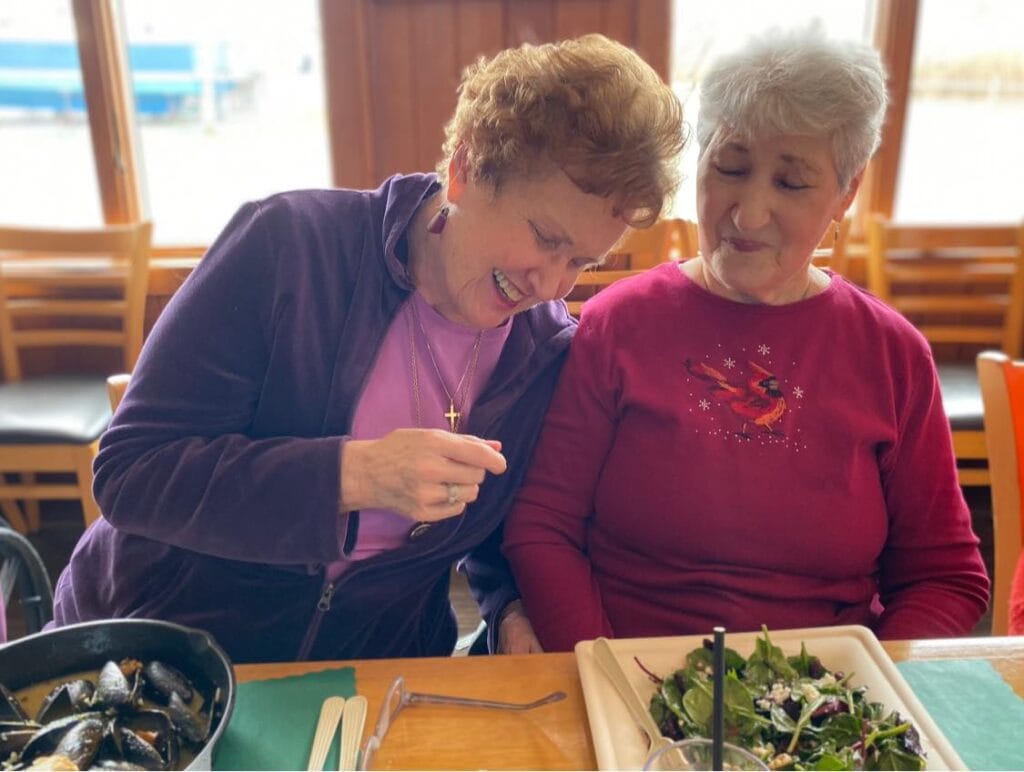Assisted living vs. home care: which do you choose? Both care options share a great deal in common.
With your and your loved one’s health at stake, it’s crucial to do your research on assisted living vs. home care.
So, how do you know which is best: assisted living or home care? At the end of the day, which one should you choose?
We understand the struggle. Choosing the right care option can be tough. With so many factors to keep in mind — activities, staffing, location, cost, and more — it’s no wonder the choice can feel overwhelming.
That’s where we come in: At Village Green, we’re here to give you peace of mind and help make your decision a little easier. We’ve compiled this short round-up article detailing everything you need to know to understand assisted living and home care.
Will you join us? We’ll discuss the advantages of assisted living and home care, the activities of each health option, and cost considerations to keep in mind.
Let’s learn all about assisted living versus home care.
Key article takeaways
- Assisted living offers seniors the opportunity to socialize with others, receive specialized care, and receive help with daily tasks.
- Home care, in-home care, and home health care are services where seniors live in the comfort of their homes and receive specialized care from a home health aide or caregiver.
- Advantages of assisted living include living in a community, receiving round-the-clock specialized care, and having flexible living options. Advantages of home care include more privacy, custom care, and one-on-one companionship.
- Public and private funding can offset the cost of assisted living and home care services.
- People who tend to need 5 or more hours a day of care often choose to live in assisted living facilities or memory care facilities versus receiving home care.
What exactly is assisted living?

Assisted living refers to a senior community that provides housing and care services to active seniors. Many of the residents in assisted living communities can live with a greater degree of independence than if they lived in a nursing home.
A sampling of common assisted living community services include the following:
- Medication management and administration
- Meal and dining services
- Social events and outings held on- and off-site
- Help with activities of daily living (ADLs)
- General housekeeping and laundry services
The advantages of assisted living

Seniors benefit a great deal when living in an assisted living community. Some of the advantages of assisted living include:
- Opportunities to socialize with others who share similar interests and values
- Flexible living accommodations
- Receiving round-the-clock care and help for ADLs and personal needs
Opportunities for socializing
Some of the many social activities and services assisted living facilities offer include:
- Holiday and birthday celebrations
- Come-and-go-as-you-please socializing in dining halls
- Casual bistros and outdoor patios
- Beauty salons and barber shops
- Fitness centers
- Creative arts studios
- A library and outdoor lounge
- Convenient transportation to offsite activities and appointments
- Business centers
- Mail and courier services
Many assisted living communities hire a designated life enrichment director whose job is to coordinate social engagements for residents. If you’ve decided assisted living is the right fit for your loved one’s lifestyle, Village Green can discuss your options with you at no extra cost to you.
Flexible living arrangements
Assisted living homes are best for those seniors who enjoy having flexibility of care as they age. Many assisted living facilities often offer short- or long-term care, depending on a resident’s needs.
For example, if your loved one recognizes they require very little senior care to maintain a quality life, your loved one can choose a plan that offers minimal personal care. If — later down the road — your loved one determines that they need a higher level of care, they can up their level of care and choose a plan that fits their care needs.
Furthermore, many assisted living and in-home care providers ask that you give 30 days or more before changing services. As a result of this contractual agreement, your loved one won’t have to worry about locking in a permanent deal. They have options!
In sum, assisted living can provide the flexible care your loved one deserves. If your loved one would like to upgrade or downgrade the care provided to them, they’re free to do so.
Round-the-clock specialized care
Assisted living facilities provide round-the-clock, as-needed care to support the well-being of residents.
Many assisted living communities provide transportation to doctor appointments, therapy services, and much more. Assisted living is appealing to families, because families know their loved one will be in good hands during a medical emergency.
Living in assisted living also comes with the benefit of added safety. Many assisted living homes have on-site security personnel and safety procedures in place.
For example, at Village Green, our floor plans are built with your loved one’s safety in mind. Each residence is equipped with an emergency call system and a private walk-in shower complete with safety bars.
Residents and their families can rest easy knowing they’re loved one is safe and protected.
“Feels like home”

“Village Green feels like ‘home.’ Not only do they provide superior home care and wellness services, but each staff member will go above and beyond to make your family member feel safe and comfortable.
The Village Green staff and leadership feel like an extension of the family with their warm, loving, and empathetic nature.” – Theresa Z., happy Village Green community member
What is home care?

Home health, in-home care, and home health care: there are a variety of different services falling under the umbrella term “home care.” A more apt name for home care might be “in-home assisted living.”
Home care refers to companionship, transportation, and assistance with ADLs for seniors who choose to live at home. The type of care provided depends on the level of care required to maintain a senior’s quality of life.
With home health care — also known as in-home nursing — licensed in-home caregivers and nurses provide a variety of care services.
Home health care agencies or individual caregivers can administer and contract out home care.
Most seniors won’t require home health care unless they live with a health condition requiring round-the-clock skilled nursing care. Home care is designed to allow seniors to receive the same care in the comfort of their homes as that of an assisted living facility.
The advantages of home care

One of the most attractive benefits of home care is that seniors receive professional care and socialize from the comfort of their homes.
Other convenient and exciting advantages of home care include:
- Companionship and one-on-one care around the house
- Receiving help with daily activities
- Customized healthcare options
Additional companionship around the house
Home-care aides can plan in-home activities for seniors. Also, many aides will create games, read books, or go on outings with seniors.
When considering care options for yourself or a loved one, we recommend asking yourself whether you prefer to live in a community or on your own. With home care, you’ll have greater help around the house, but you may not be able to socialize in a community without more extensive planning and effort.
At many senior living communities, residents can enjoy pre-planned, customized events. Consider your loved one’s energy for socializing and whether assisted living or home health is best for you or your loved one.
Help with daily activities
Like assisted living, home care providers also help with personal care tasks and housekeeping. Whether you or a loved one need help with meal preparation, transportation to and from activities, bathing, help using the bathroom, dressing, or grooming, home care can help with it all.
Custom care options
One of the largest differences between assisted living and home care is in the customization of care. Many home care agencies hire caregivers with expertise in specific medical conditions.
With home care, seniors can receive custom care from caregivers for medical conditions, such as:
- Parkinson’s disease
- Lewy Body dementia (LBD)
- Alzheimer’s disease
- Physical disabilities
- And more
Home care may provide a greater variety of custom health care services to seniors. With that said, sometimes, home care is more expensive as a result.
But not to worry. We’ll cover the cost of assisted living and home care in the next section.
Comparing costs: assisted living vs. home care

| Assisted Living | Home Care |
| 1. Medical care and monitoring provided for residents 2. Help with daily living activities (ADLs) 3. Pre-planned events and opportunities for socializing in the community 4. Restaurant-style dining, cafes, meal grab-and-go offerings, and meal preparation 5. An option for individuals who live an active life, enjoy socializing, and want to live in a community 6. Accommodations: apartment-style rooms in a community facility Less expensive than home care (and many long-term care options) | 1. In-home care and monitoring provided 2. Help with daily living activities (ADLs) 3. Opportunities for companionship 4. Meal preparation provided 5. An option for individuals who want to age in the comfort of their home 6. Accommodations: a senior’s home More expensive than assisted living |
When you choose between assisted living and home care, consider the cost of care when living at home versus in an assisted living community. As of 2020, assisted living communities have jumped in price by 4.65%, according to a 2023 Statista.com survey.
The same survey found that assisted living in the U.S. costs an average of $4,500 a month. In contrast, an in-home health care aide can cost upwards of $5,100 a month in the U.S., according to a Genworth.com survey.
Calculating the cost of assisted living and home care
The cost of assisted living and home care is based on several factors, including:
- The size of apartment or home tended to
- Which state a senior resides in
- Whether a senior lives with roommates
- The level of care needed
- The amount of home maintenance needed
- Staff salaries
- The amount of coverage provided by your insurance carrier
Funding sources for assisted living and home care
Many long-term care insurances exist to help offset the cost of home health and assisted living. Many seniors and their loved ones also help pay for the remaining cost of assisted living and home care through the following payment options:
- Government-funded public programs and initiatives (e.g. Medicaid, Medicare, and Medicaid waivers)
- Veterans Administration (VA) and military benefits (e.g. pensions, retirement funds, and disability compensation)
- Long-term care insurance (e.g. AARP, New York Life Insurance, and other long-term care insurance carriers)
- Investments (e.g. retirement funds, savings, and home equity)
Deciding between assisted living and home care?

When choosing between home care and assisted living, it’s best to make your choice based on the amount of care needed for you or your loved one.
For example, if your loved one could use four to five (or more) hours a day of care and would like to live in a community with others, assisted living or memory care is the best option. But if your loved one needs less help and prefers to age in the comfort of their home, home care may be best.
The good news is that you’ll win either way. Both assisted living and home care provide much-needed help with activities of daily living (ADLs), meal preparation, housekeeping, companionship, transportation, and social activities.
As you’re doing your research, know that you don’t have to go through the process alone. The senior living advisors at Village Green would be happy to guide you through the entire process.
If you have any questions at all, we’d love to hear from you (our senior living advisors love questions)!
To schedule a complimentary facility tour — or to discuss your questions with a member of our senior living staff — don’t hesitate to reach out today.
Frequently Asked Questions (FAQ)

Assisted living vs. home care: what are the key benefits of each?
Assisted living provides:
- Opportunities for socializing in a community setting
- Round-the-clock specialized care
- Flexible living arrangements and contracts
Home care provides:
- One-on-one companionship
- Help with activities of daily living (ADLs) around the house
- Custom medical care
In summary, assisted living allows residents to receive care and help as part of a community of residents. Home care allows seniors privacy in the comfort of their own home.
How much does each care option cost?
According to a 2023 Statista.com survey, assisted living costs on average $4,500 a month in the U.S. In contrast, an in-home health care aide can cost upwards of $5,100 a month in the U.S., according to a Genworth.com survey.
Many seniors choose to pay for care in different ways. Seniors can pay for care through:
- Government-funded public programs
- Military benefits
- Long-term care insurances
- Personal investments
When is it time to choose assisted living vs. home care?
The decision is up to you. It depends on your family’s needs.
At Village Green, we tell our families that they should consider assisted living or home care if their loved ones start showing the following signs and symptoms:
- Difficulties with concentration or remembering routine tasks
- Forgetting to take medications
- Inability to perform regular activities around the house
- Losing or gaining weight
- Loss of mobility
- Loss of interest in general hobbies
- Neglected house maintenance
- Unusual changes in behavior or mood
Keep your senior loved ones healthy this season
Viral illnesses can have serious long-term effects on older adults. It’s important to make sure your loved one’s immune system is firing on all cylinders.
As a thank you for reading this blog, you’re invited to explore our company’s nine best practices for strengthening your immune system. The article is packed with helpful suggestions for maintaining a long, healthy, and prosperous life.




